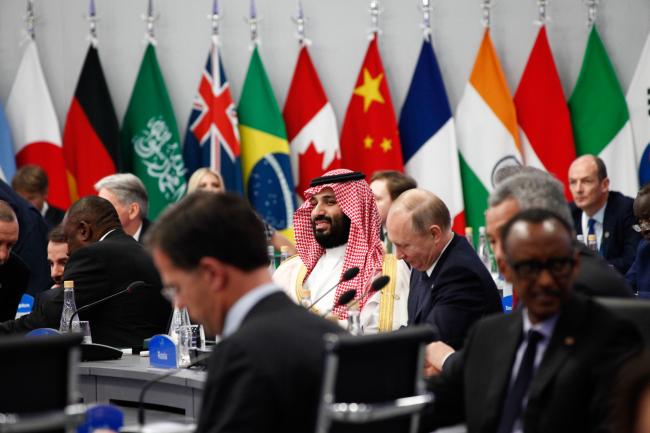(Bloomberg) -- At one point this week, several Group of 20 negotiators threw their hands in the air and started talking openly about having no communique to present to their leaders on Saturday to sign.
The frustration reflects the tensions around trade policy in an era of resurgent protectionism -- already underway before Donald Trump became U.S. president but hastened by his elevation -- and the pressure on negotiators after the failure at recent gatherings to get, or sustain, a final agreement. Right now that means the most likely outcome is a wishy-washy document produced after "sherpas" negotiate through Friday night.
For the past couple of days sherpas have been looking at either a watered down agreement or no communique at all, amid the realization this could be the first summit since the G-20 began a decade ago to end without a formal statement. But with leaders already in Argentina for their two-day gathering, the desire now is to push on towards something they can call a deal.
To get there, hot-button issues are likely to be mentioned only in very broad and general terms, according to at least four people with direct knowledge of the talks. Some of them said they were confident of getting a final communique, but would not detail any of its content.
The process of drafting a communique for the Argentina meeting has been "unprecedentedly long,” Russia’s sherpa Svetlana Lukash said. “We will continue to work tonight and it will be the fifth day of drafting. We are working very hard. It’s very complicated.” While key differences remain, "I think we still have a chance to agree on a final communique."
Expected to be off the list is any mention of the disquiet many leaders feel about the brutal killing of columnist and critic Jamal Khashoggi in October in the Saudi Arabian consulate in Istanbul. Even a Canadian push for a line saying that members respect the freedom of the press is likely to be off-limits, presumably unpalatable to nations such as Turkey that have also been accused of abusing such freedoms.
Also unlikely to make it into the document is a unified statement of concern over renewed Russian aggression against Ukraine. That has been handled already by a separate statement issued Friday by foreign ministers from the smaller Group of Seven nations, which does not include Russia.
There is lingering disagreement over climate issues in the communique, one official said.
Sticking Point
But trade remains the biggest sticking point, with negotiators at odds over how to describe growing tensions in the world. China and the U.S., the countries spearheading a commercial standoff, at least agreed to reference the multilateral trade system, a small gesture by the U.S. in acknowledging global trade rules, according to one official. Even so, that is being seen by some European officials as a failure to defend the existing order.
Asked about the contents of a draft statement, a U.S. official familiar with the talks simply said progress was being made.
What they could agree on is something that is more tangible and measurable -- the pace of economic growth. While global expansion continues, the balance of risks has worsened since finance ministers last met in the Argentine capital in July. The document is likely to cite U.S. interest rate hikes, trade tensions and geopolitical risks as the main culprits.
"Nobody sees a crisis but the risks have become more apparent, the mood more somber," Brazil’s Finance Minister Eduardo Guardia said in an interview. "There’s risk ahead that needs to be taken seriously."
Smaller groups
Some of the discussions highlighted the cracks in the overall group. Earlier Friday the so-called BRICS nations -- Brazil, Russia, India, China and South Africa -- spoke out in favor of multilateral trade, while the G-7 issued its statement on Ukraine.
"Frankly, there are a lot of issues at play in the world where strong statements from the G-7 are important and valuable," Chrystia Freeland, Canada’s foreign minister and G-7 host, told reporters in Buenos Aires.
Eager to counter Trump on climate and migration issues, French President Emmanuel Macron is pushing for a common front with like-minded countries of "goodwill" to prevent a watering down of language on the Paris climate accord. One of those countries Macron seeks to enlist is Japan, an official said, which takes the mantle as G-20 host in 2019. Publicly at least, though, Prime Minister Shinzo Abe has shown little desire to act in ways that might upset economic ties between the U.S. and Japan.
A second, consecutive late night of negotiations could still produce something on Saturday that wouldn’t look like failure. But as one delegate to Argentina this year put it, the document is increasingly looking like a laundry list, rather than a road map for global policies.
“In negotiating, the U.S. side always tenaciously put American interests first, but we believed that it was in our interest to find common ground in the end because the U.S. benefited from multilateral cooperation,” said Mark Sobel, a lead negotiator for the U.S. on G-20 summit communiques from 2008 to 2014.
“Should that not prove possible in Buenos Aires, as was the case in the G-7 and APEC this year, it would be another setback for the U.S.,” he added. “The Argentine hosts deserve better."
